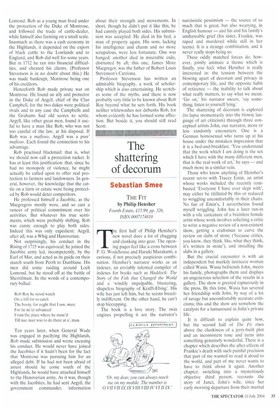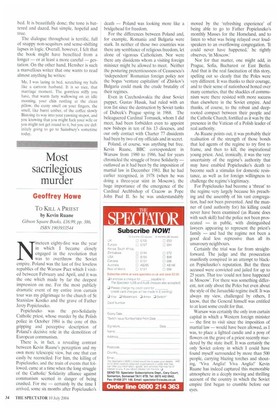The shattering of decorum
Sebastian Smee
THE FIT by Philip Hensber Fourth Estate, £15.99, pp. 326, ISBN 0007174810 The first half of Philip Hensher's new novel does a lot of chugging and clunking into gear. The opening pages feel like a cross between P. G. Wodehouse and Haruki Murakami, a curious, if not precisely auspicious combination. Hensher's narrator works as an indexer, an enviably talented compiler of indexes for books such as Haddock: The Stoty of the Fish that Changed the World and a 'windily impalpable, blustering, shapeless biography of Krafft-Ebing'. His wife has just left him, but he seems breezily indifferent. On the other hand, he can't stop hiccupping.
The book is a love story. The twin engines propelling it are the narrator's narcissistic pessimism — the source of so much that is great, but also wearying, in English humour — and his and his family's unshareable grief (his sister, Frankie, was raped and murdered while still in her teens). It is a strange combination, and it never really stops being so.
These oddly matched forces do, however, jointly animate a theme which is finally, you feel, what Hensher is really interested in: the tension between the blowing apart of decorum and privacy in contemporary life, and the opposite habit of reticence — the inability to talk about what really matters, to say what we mean. 'Go on,' his narrator sneers, 'say something; listen to yourself lying.'
The shattering of decorum is explored (to lapse momentarily into the blowsy language of art criticism) through three conceptual artists John, our narrator, more or less randomly encounters. One is a German homosexual who turns up at his house under the mistaken impression that it is a bed-and-breakfast. 'You understand that the work which I am doing is the sex which I have with the many different men, that is the real work of art,' he says — and much more in a similar vein.
Those who know anything of Hensher's recent set-to with Tracey Emin, an artist whose works included the recently cornbusted 'Everyone I have ever slept with', may either be titillated by this or reduced to wriggling uncomfortably in their chairs. No fan of Emin's, I nevertheless found myself wriggling. John has a later run-in with a vile caricature of a brainless female artist whose work involves soliciting a critic to write a negative review of a non-existent show, getting a craftsman to carve the review on slabs of stone (because critics, you know, they think, like, what they think, it's written in stone'), and installing the slabs in a gallery.
But the crucial encounter is with an independent but murkily insincere woman called Wasia. Wasia befriends John, meets his family, photographs them and displays an ungenerous selection of the results in a gallery. The show is greeted rapturously in the press. By this time, Wasia has severed her friendship with John, by way of a lot of savage but uncomfortably accurate criticisms; this and the show are somehow the catalysts for a turnaround in John's private life.
It is difficult to explain quite how, but the second half of The Fit rises above the clunkiness of a jerry-built plot and an inconsistent tone and turns into something genuinely wonderful. There is a chapter which describes the after-effects of Frankie's death with such painful precision that part of me wanted to read it aloud to the world, and part of me never wants to have to think about it again. Another chapter, switching into a mysteriously objective third person, recounts the story of Janet, John's wife, since her early morning departure from their marital
bed. It is beautifully done; the tone is battered and dazed, but simple, hopeful and true.
The dialogue throughout is terrific, full of snappy non-sequiturs and sense-shifting lapses in logic. Overall, however, I felt that the book might have benefited from a longer — or at least a more careful — gestation. On the other hand, Hensher is such a marvellous writer that one wants to read almost anything he writes:
Me, I was lazing in bed, scratching my balls like a cartoon husband. It is so nice, that marriage moment. The gormless stiffy you have, that warm farty wallowing on an idle morning, your chin rustling at the clean pillow, the cunty smell on your fingers, the smell, like burnt umber, of the coffee slowly Bistoing its way into your yawning stupor, and you knowing that you might fuck your wife or you might not get round to it, but you are definitely going to go to Sainsbury's sometime today.



























































 Previous page
Previous page